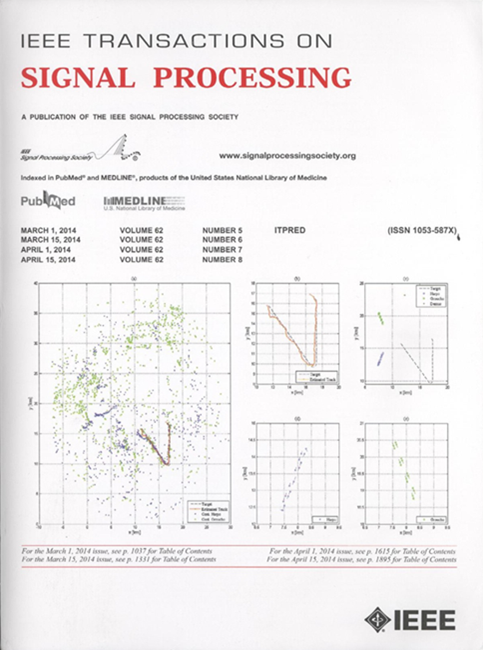Regret Based Bayesian Sequential Experiment Design for Sensor Management
IF 5.8
2区 工程技术
Q1 ENGINEERING, ELECTRICAL & ELECTRONIC
引用次数: 0
Abstract
Measurement design is an important sub-problem arising in the applications of sensing and wireless communications. Sensing systems are often capable of performing different types of mutually exclusive measurement actions. In such systems, it is important to select measurement actions so as to efficiently gather samples which are most informative about the phenomena of interest. Bayesian sequential experiment design (BSED) offers a model-based framework with which to address sequential variations of such measurement design problems. Prior applications of BSED to sensing problems often consider measurement selection policies which maximize notions of expected information gain (EIG). In certain related settings, EIG based approaches have been shown to be less performant than policies designed to minimize notions of regret with respect to the information gain afforded by an ideal policy. Motivate by this, we develop a general framework based on partially observable Markov decision processes which allows for the design of BSED policies with respect to a notion of regret. We argue for the consideration of policies based on a myopic version of posterior sampling, termed MPS, and consider the application of this framework to the problem of passive non-coherent signal source localization and detection using codebook-based receive beamforming. We further develop a general approach for approximating posterior inference based on variational inference and a power law generalization of Bayes’ rule. We conduct an empirical analysis of the application of MPS and EIG to our considered application. Our results indicate that MPS outperforms EIG while providing improved robustness.基于后悔的传感器管理贝叶斯序列实验设计
测量设计是传感和无线通信应用中出现的一个重要子问题。传感系统通常能够执行不同类型的互斥测量动作。在这样的系统中,重要的是选择测量动作,以便有效地收集关于感兴趣的现象的最有信息的样本。贝叶斯序贯实验设计(BSED)提供了一个基于模型的框架来解决这类测量设计问题的序贯变化。先前基于神经网络的传感问题的应用通常考虑测量选择策略,以最大化预期信息增益(EIG)的概念。在某些相关的设置中,基于EIG的方法已被证明不如旨在最小化遗憾概念的策略,相对于理想策略提供的信息增益。在此激励下,我们开发了一个基于部分可观察马尔可夫决策过程的通用框架,该框架允许设计基于后悔概念的BSED策略。我们主张考虑基于后验采样(称为MPS)的近视版本的策略,并考虑将该框架应用于无源非相干信号源定位和使用基于码本的接收波束形成的检测问题。我们进一步发展了一种基于变分推理和贝叶斯规则的幂律推广的近似后验推理的一般方法。我们对MPS和EIG在我们考虑的应用中的应用进行了实证分析。我们的结果表明,MPS优于EIG,同时提供改进的鲁棒性。
本文章由计算机程序翻译,如有差异,请以英文原文为准。
求助全文
约1分钟内获得全文
求助全文
来源期刊

IEEE Transactions on Signal Processing
工程技术-工程:电子与电气
CiteScore
11.20
自引率
9.30%
发文量
310
审稿时长
3.0 months
期刊介绍:
The IEEE Transactions on Signal Processing covers novel theory, algorithms, performance analyses and applications of techniques for the processing, understanding, learning, retrieval, mining, and extraction of information from signals. The term “signal” includes, among others, audio, video, speech, image, communication, geophysical, sonar, radar, medical and musical signals. Examples of topics of interest include, but are not limited to, information processing and the theory and application of filtering, coding, transmitting, estimating, detecting, analyzing, recognizing, synthesizing, recording, and reproducing signals.
 求助内容:
求助内容: 应助结果提醒方式:
应助结果提醒方式:


